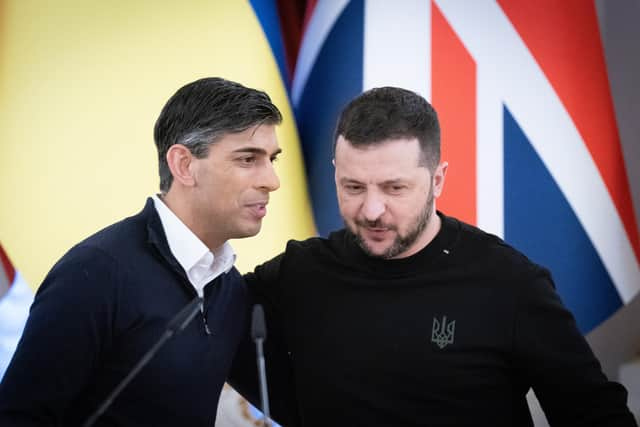Where would a Trump administration leave the UK when it comes to Ukraine? - Patrick Mercer
Only one crumb was thrown to Kiev: the G7 group unveiled the idea of bi-lateral agreements being reached with Ukraine for long term security arrangements that would deter Russia from future aggression. Then, suddenly, a few days ago Mr Sunak went to Kiev and pulled a rabbit from his hat in the shape of the first of these agreements. It’s extremely difficult, though, to make a shred of sense of it.
Linked to this new agreement was a £2.5bn tranche of money earmarked for more cruise missiles, ammunition and drones, but that sum would only be delivered over the next 12 months.
Advertisement
Hide AdAdvertisement
Hide AdNow, clearly, that’s not as selfless as it looks as the cash will largely be spent within the British defence industry but - newsflash - there’s an election coming sometime over the next nine months which is highly likely to see Mr Sunak out on his ear.


So, how can he promise things that he won’t be able to deliver? How can Kiev take him seriously?
Next question, the Iowa caucus suggests that President Biden will probably face ex-President Trump also next November. Now, I’d suggest Mr Biden’s chances of being in power by next autumn are as likely as Mr Sunak’s whilst Mr Trump, of course, has promised to end the war in Ukraine, “…in about 24 hours.”
Is a newly elected British government really going to fly in the face of a fresh President’s avowed foreign policy? The same Britain which has meekly sent her warships into the Red Sea on Uncle Sam’s orders - I doubt it.
Advertisement
Hide AdAdvertisement
Hide AdThen there’s the question of what the UK would actually send to counter any new Russian aggression? Pay attention Mr Sunak, we’re fresh out of troops, planes and ships: one of our giant carriers has broken down and we can’t deploy the other because of the Navy’s recruiting disaster and defunct logistic support. And why new aggression? Isn’t Russia already aggressive enough?
That phrase is interesting, though. Russia now has a powerful, new army and airforce poised to open a ‘second front’ in Ukraine, probably aimed at the lightly defended area of the border somewhere north of Kharkov. Such a thrust would threaten the seat of government and might be considered ‘new aggression’; it’s certainly enough to have propelled the UK to sign this empty agreement with Canada, France, Poland and others being likely to follow suit.
But, modest sums from Britain and individual European states simply won’t answer. Unless the combined $100bn pledged by the US and EU can be unshackled from the complex politics that are choking the funds from Washington and Brussels then, as a US think tank put it last week, “…the Ukrainians are really going to be in very great difficulty”.
Now flip the coin. With the Middle East in turmoil, Russia has swiftly announced that a ‘major intergovernmental treaty’ has almost been finalised between themselves and Iran. There’s plenty of cooperation between the two countries already, but in simple terms this will mean that both parties guarantee to come to each other’s aid should they be attacked - clearly implying by NATO.
Advertisement
Hide AdAdvertisement
Hide AdConjure with that. Iran backs almost every violent, terrorist element from the Dead to the Red Sea and her relationship with the US and NATO is always near boiling point. Iran has recently struck targets in Iraq, Syria and Pakistan, all of which have pushed the West to the brink of direct retaliation, but once the treaty is signed, any counter strike would guarantee Russian involvement. These aren’t the hollow gestures of Mr Sunak’s agreement with Ukraine, though: this treaty must change everyone’s strategic and tactical thinking. Now Russia must also do some careful thinking. Moscow has now put her economy on a war footing and has plenty of newly minted troops and kit poised against a sadly weakened Ukraine. She’s also very experienced in battle and, with their presidential election looming in March, you can almost hear the generals begging to be allowed to deliver a telling victory.
Yet, putting aside the unpredictability of war, President Putin fully understands that a full throated, bloody assault on Zelensky’s boys would not only pull a wavering NATO back together, it would also cement support for Mr Biden and probably deny Donald Trump the victory he expects next November.
Now that’s exactly what the Kremlin doesn’t want. Counter intuitively, if Russia plays for political time on the battlefield Kiev might get the space she needs to regroup, conscript massively and refresh herself as the West finds more money to support their embattled partner.
Similarly, General Sergei Shoigu - the Kremlin’s military boss - will know that he’s got a relatively short period of time to deal Ukraine a fatal blow. Delivering that very blow, though, could very well bring disaster for Russia in the longer term.
Advertisement
Hide AdAdvertisement
Hide AdIt’s a real conundrum for Moscow and it might - just might - give Ukraine the opportunity she needs to turn the tables.
Meanwhile, whilst the grown ups wrestle with deadly, three dimensional chess our prime minister whiles away the autumn of his power with his broken navy and cash strapped airforce like a kid in a sandpit.
Patrick Mercer is a former MP for Newark and Army colonel.
Comment Guidelines
National World encourages reader discussion on our stories. User feedback, insights and back-and-forth exchanges add a rich layer of context to reporting. Please review our Community Guidelines before commenting.